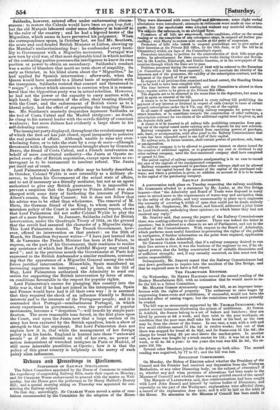Saldanha, however, entered office under embarrassing circum- stances: to restore
the Cabrals would have been un peu trop fan; but the old Marquis laboured under some deficiency in himself to be the ruler of the country ; and he had a bigoted terror of the Miguelites, which seems to have perverted his judgment. When. the correspondence-opens, in October last, we find Mr. Southern, the acute and cool-headed. British Minister at Lisbon, showing up the Marshal's undiscriminating fear : be confounded every hosti- lity to Government with a Miguelite movement. Portugal was now torn by civil war, of that most deplorable kind in which neither of the contending parties possesseathe intelligence to know its own position or power to obtain an ascendancy. Saldanha's conduct was a series of blunders that merit no term short of stupidity. So early as October, in his blind alarm about the " Miguelites," he had applied for Spanish intervention : afterwards, when the Queen would have acceded to a liberal basis of negotiation with the insurgents, Saldanha resisted that counsel and threatened to " resign" •' a threat which amounts to coercion when it is remem- bered that the Opposition party was in actual rebellion. However, he had not the power or the capacity to carry matters with a high hand ; the intervention of the allies, their treating directly with the Court, and the enforcement of British views as to a liberal policy, had the effect of superseding the bungling Minis- ter. Mr. Southern's masterly despatches represent Saldanha as the tool of Costa Cabral and the Madrid intriguers : no doubt, he clung to his natural leader with the servile fidelity of conscious - weakness ; but mere dulness had evidently a large share in his self-defeating career.
The insurgent partydisplayed, throughout the revolutionary war of which the first act has just closed, equal incapacity to perceive the real position of affairs. Although unable to raise any over- whelming force, or to take the state by a coup de main—although threatened with a Spanish intervention brought about by Gonzalez Bravo, the friend of Costa Cabral, and a French intervention on behalf of mere constituted authority—the Junta at Oporto re- pelled every offer of British negotiation, except upon terms so ex- travagant as to be tantamount to insolent refusal. The Junta put itself out of court. Lord Palmerston's share in the affair may be briefly described. In October, Colonel Wylde is sent ostensibly as a military ob- server, to inform his Government of the actual state of affairs, and to act if necessary as a friendly mediator, but not as an agent authorized to give any British guarantee. It is impossible to prevent a suspicion that the Equerry to Prince Albert was also charged with some duty of furthering the interests of Prince Albert's cousin, the King Consort; but it does not follow that his advice was to be other than wholesome. The removal of M. Dietz, the German friend of the King, to whom much of the mistaken policy of the Court is ascribed by general repute, shows that Lord Palmerston did not suffer Colonel Wylde to play the part of a mere flatterer. In January, Saldanha called for British intervention, under the Quadruple Treaty of 1834, on the ground that the revolt had assumed the character of a Miguelite rising. This Lord Palmerston denied. The French Government, how- ever, offered its intervention on that pretext : on the 20th of March, Sir Hamilton Seymour writes—" I have just learned that M. de Varennes the French Minister has been at the Palace, to express, on the part of his Government, their readiness to render any assistance of which her Most Faithful Majesty may stand in need " ; and in the previous month the Government at Paris had expressed to the British Ambassador a similar readiness, contend- ing that the appearance of a Miguelite General among the rebel forces justified intervention. Meanwhile, Spain manifested an increasing eagerness to interpose; and at last, on the 22d of May, Lord Palmerston authorized the Admiralty to send out orders for supporting the British intervention by force of arms, on conditions favourable to the respect for popular rights.
Lord Palmerston's excuse for plunging this country into the little war is, that if he had not joined in the interposition, Spain and France would have had it all their own way : it is assumed that they required the check of an influence friendly to British interests and to the interests of the Portuguese people; and it is contended that Portugal—semibarbarous Portugal, in which every experiment in government, even the product of popular movements, becomes a " despotism "—will benefit by simple paci- fication. The more reasonable tone forced, in the first place upon the Court, and upon. the Junta now that a large section of its army has been captured by the British squadron, lends a show of strength to that last argument. But Lord Palmerston does not explain how it is, that while the management of her foreign policy is in his hands, England is hurried into these "untoward events " as if she retained no will of her own, no power of action independent of wretched intrigues in Paris or Madrid, of still more miserable puerilities at Oporto ; how it is that the policy of this great country is helplessly at the mercy of such paltry alien influences.


























 Previous page
Previous page